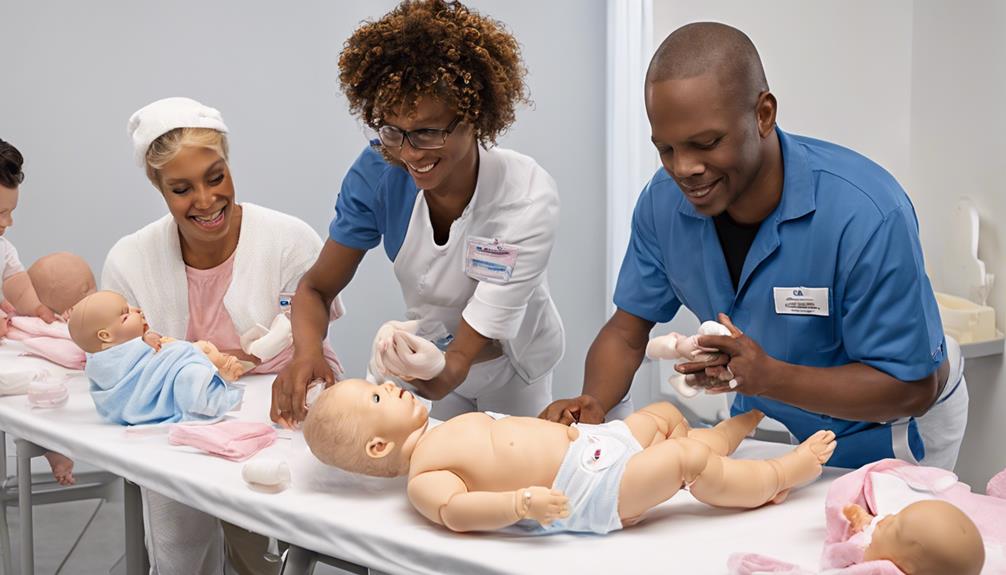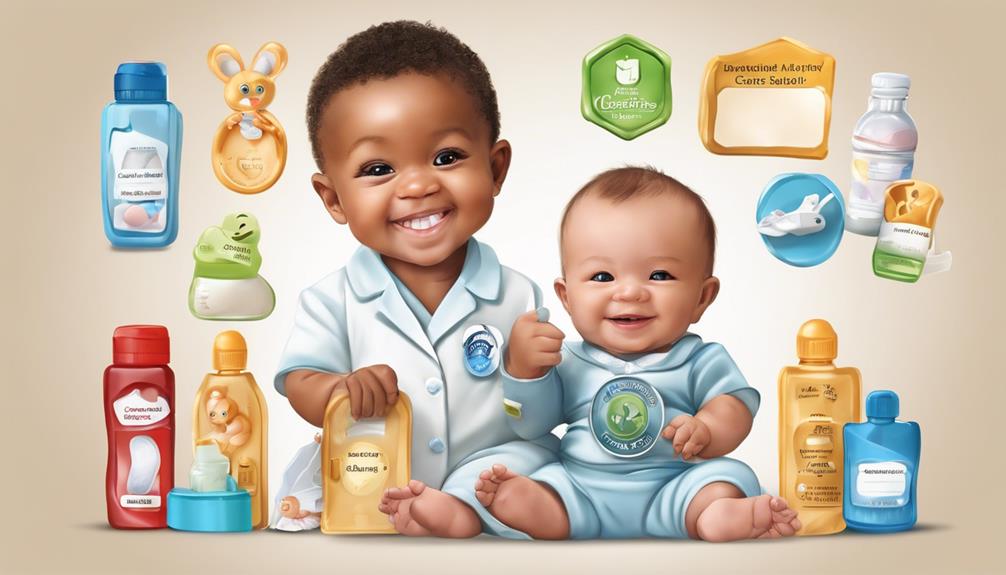As we embark on the path to becoming a Newborn and Infant Care Specialist, the certification process provides a structured way to enhance our skills in this specialized area.
But what exactly does it entail, and how can one navigate the certification process effectively? Let's explore the intricate steps and essential considerations that pave the way for aspiring individuals to excel in providing excellent care for newborns and infants.
The certification guide offers a roadmap towards professional growth and opportunities, ensuring that we are well-equipped to make a meaningful difference in the lives of families and their little ones.
Key Takeaways
- Accredited training programs and relevant experience are crucial for becoming a certified newborn care specialist.
- Certification enhances credibility, career advancement, and earning potential in the industry.
- Seek mentorship from experienced professionals to develop necessary skills and receive personalized guidance.
- Specialized training programs and continued education workshops provide formal recognition of expertise in newborn care.
Essential Requirements for Certification
To become certified as a Newborn Care Specialist, one must complete accredited training programs. These programs explore essential aspects such as newborn care, CPR, and first aid. Acquiring relevant experience working with newborns is also crucial. This specialized training equips professionals with the necessary skills to excel in this field.
The NCS Association and programs like Newborn Care Training International offer certification options. These certifications enhance credibility and demonstrate commitment to providing high-quality care to newborns.
Training Options and Programs Available

Exploring the array of training options and programs available can greatly enhance our skills and knowledge as a Newborn Care Specialist. When considering newborn care specialist training, there are various programs to choose from, each offering unique benefits and insights into the field.
Some popular options include:
- Newborn Care Solutions® Foundational program: Tailored for newer NCS, nannies, doulas, and experienced infant daycare workers, covering essential topics like postpartum mood disorders and business basics.
- Postpartum doula training: Focuses on supporting families during the postpartum period, providing hands-on experience in working with families.
- Continued education workshops: Offer opportunities to expand knowledge and skills in specialized areas such as infant health and development.
- Certification programs: Provide formal recognition of expertise in the field, enhancing credibility when seeking NCS work.
- Mentorship programs: Pair aspiring NCS with experienced professionals for guidance and support in dealing with the challenges of the role.
Steps to Kickstart Your Career
Let's explore the essential steps required to kickstart your career as a Newborn and Infant Care Specialist.
First and foremost, gaining experience working with infants in a professional setting is important to meet the prerequisites for NCS training. It's crucial to mention that you must be at least 18 years old before enrolling in a Newborn Care Specialist program.
When selecting a training program, opt for an accredited one that covers a wide range of newborn care topics to guarantee thorough learning.
Consider the different enrollment options available, such as discounted packages or monthly payment plans for your training course. These choices can make pursuing your NCS certification more accessible.
Additionally, make the most of the additional resources provided by organizations like the NCSA for accreditation, CEUs, and ongoing support throughout your career.
Benefits of Becoming a Certified Specialist

Enhancing expertise through certification elevates credibility and distinguishes newborn and infant care specialists within the industry. It not only validates our skills but also sets us apart from others, giving us a competitive edge. As certified specialists, we can provide a wide range of services to families, demonstrating our deep knowledge and proficiency in newborn care. Parents often seek out certified professionals for the assurance of our professional skills and expertise, knowing their little ones are in capable hands. Certification paves the way for career advancement, opening up doors to higher earning potential in this rewarding field.
- Credibility: Certification enhances trust and credibility in the eyes of families.
- Competitive Edge: Being certified gives us an advantage over non-certified specialists.
- Expertise Showcase: Certification allows us to showcase our in-depth expertise in newborn care.
- Assurance: Parents prefer certified specialists for the assurance of professional skills and knowledge.
- Career Advancement: Certification leads to opportunities for career growth and higher earning potential.
Expert Mentorship and Guidance
Establishing a strong foundation in newborn and infant care often involves seeking guidance and support from expert mentors in the field. These mentors play a critical role in shaping aspiring individuals into competent newborn care specialists (NCS). Through mentorship programs, individuals gain practical insights and knowledge from seasoned professionals, honing their expertise in newborn care practices, feeding techniques, and even the business aspects of being an NCS.
Expert mentors are instrumental in helping individuals navigate the certification process and enhance their skills in newborn and infant care. They provide personalized support and tailored advice, ensuring that each person receives guidance specific to their career goals in this field. This one-on-one mentorship not only fosters professional growth but also fosters a sense of confidence and competence among those seeking to excel in newborn and infant care. With the guidance of experienced mentors, individuals can develop the necessary skills and knowledge to become successful newborn and infant care specialists.
Frequently Asked Questions
What Is NCS Training?
NCS training equips us with essential skills in newborn care, feeding, and troubleshooting common issues. It also covers recognizing signs of postpartum mood disorders and conditions like tongue tie and reflux. This extensive curriculum readies us for effective work as Newborn Care Specialists.
What Is a Newborn Care Specialist?
We are the experts in newborn care, supporting families with feeding, sleep, and routine establishment. Our role as Newborn Care Specialists is crucial in helping parents navigate the challenges of early parenthood, offering expertise and guidance.
What Is the Difference Between a Newborn Care Specialist and a Postpartum Doula?
We provide care for newborns. Newborn Care Specialists focus on baby care, while Postpartum Doulas support the whole family. Specialists are trained for newborn-specific tasks, while Doulas offer emotional support and help with postpartum recovery and family adjustment.
What Are the 5 Initial Steps of Newborn Care?
We start by checking the baby's airway, breathing, and circulation. Ensuring warmth, watching for distress or abnormalities, giving vaccines, and providing skin-to-skin contact for bonding are all important steps in newborn care.
Conclusion
So, there you have it – becoming a certified Newborn and Infant Care Specialist is a breeze! Just a few simple steps, some training, and voila – you're ready to take on the world of newborn care.
It's almost too easy, right? But hey, don't underestimate the importance of certification and the benefits it can bring. Trust me, it's worth it in the end.









